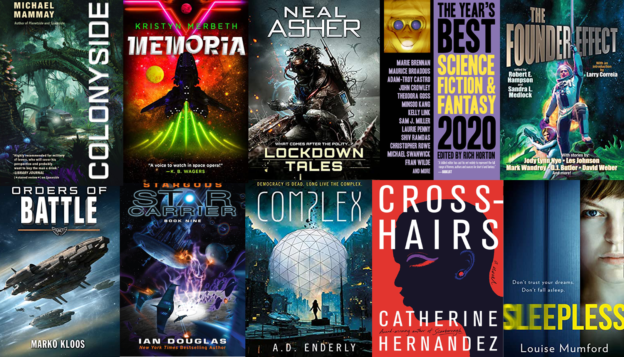The end is near! The end is near! When it comes to 2020, that’s a good thing, but as Yogi Beara pointed out, it’s hard to make predictions, especially about the future. Hopefully, you’ve enjoyed a lot of good books this year, and we’ve got a few more coming this month to close the year out. I can’t promise a better year in 2021, but I know there are some great reads on the horizon. Meanwhile, don your kerchief or cap, settle down for a long winter’s eve, and read some of December’s books.
Reviewed:
- Complex by A.D. Enderly | 01 Dec 2020|Luminary Media
- The Founder Effect by Robert E. Hampson and Sandra L. Medlock | 01 Dec 2020|Baen
- Stargods by Ian Douglas | 01 Dec 2020|Harper Voyager
- Memoria (The Nova Vita Protocol (2)) by Kristyn Merbeth | 08 Dec 2020|Orbit
- he Year’s Best Science Fiction & Fantasy, 2020 Edition by Rich Horton | 08 Dec 2020|Prime Books
- Orders of Battle (Frontlines Book 7) by Marko Kloos | 08 Dec 2020|47North
- Lockdown Tales by Neal Asher | 15 Dec 2020|Newcon Press
- Colonyside: A Novel by Michael Mammay | 29 Dec 2020|Harper Voyager
There are always more interesting books out than I could get read, so you should take a look at my Other Recommendations and the links to what other reviewers came up with in my Usual Suspects section, and if you can’t wait for these titles to be released, check out last month’s column.
Novels (in order of publication)
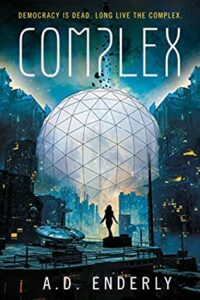 Complex Vby A.D. Enderly | 01 Dec 2020|Luminary Media
Complex Vby A.D. Enderly | 01 Dec 2020|Luminary Media
You can live free and get by, maybe. Or you can sign on with a complex and be taken care of. The only cost is your freedom.
Complex is a dystopian post-cyberpunk debut from A.D. Enderly, set in a future where governments provide “Legacy” support for the population but only at barely survivable levels. The complexes are the logical extension of today’s large mega-tech companies, where signing your rights away puts you under their care, but ironically, essentially makes you their slave…and therefore not cared about.
Val and her sister, Kat, are scraping by as they follow their father’s dying request; never join a complex. Only one complex has other ideas. Mining big data for DNA, it sees potential in Kat’s genetic makeup and snatches her for a life extension study, one in which they’ve never had a subject survive. Val, desperate to get her sister back at any cost, doesn’t realize that it’s going to take a revolution.
The good news about Complex is that the world-building is first-rate, full of societal tiers and nuanced characters. The bad news is that it’s a much bigger book than it needed to be. At over 500 pages it tends to wander a bit before getting the job done. Still, it’s an impressive debut and it looks like there’s more of the story to tell. The complex that Kat has been taken by is run by Cairo, the most powerful AI around, and it has plans for humanity that will only be revealed as the series goes on.
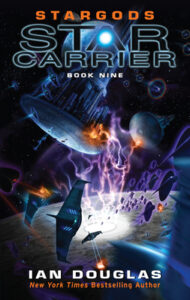 Stargods by Ian Douglas | 01 Dec 2020|Harper Voyager
Stargods by Ian Douglas | 01 Dec 2020|Harper Voyager
Stargods is billed as the final entry in Ian Douglas’s Star Carrier series, set after the final conflict with the Sh’dar who attacked Earth way back in book 1, Earth Strike. Trever Gray has been the main character throughout, rising from a squatter in Manhattan’s ruins to an admiral in charge of the Star Carrier Group. With the war over, what’s to worry about? Mostly the upcoming Singularity, which we’ve now seen alien races handle pretty badly. Though Earth’s politicians are doubling down on abandoning a world with AI to avoid whatever comes next, a few, including Konstantin, Earth’s most powerful AI (located mostly on the moon), and Alexander Koenig, the former president, want to send Trevor on an end-run around the current administration to find the remnants of the Sh’dar that didn’t opt to ascend into virtual light and see if there is anything humanity can do to avoid a total meltdown.
Oddly, meeting with aliens for coffee and conversation isn’t the most interesting part of the book. The fun starts when a U.S. President asks the Russians for a favor to help stop the fleet, and the turmoil back on Earth, as various factions try to sabotage our space-going capability and shut down all the AIs, despite the fact that those two items are holding civilization together.
Crazy humans. Good thing nothing like that happens in real life. Ian Douglas is a solid mil-sf writer, and he’s generally on solid ground from a hard-sf standpoint, allowing for the occasional jump gate and FTL drive. There’s hardly a hint of identity politics here unless you count the occasional android love affair, but even that’s handled with a minimum of angst.
While this is the end of one series, we’ll have to wait and see if the conflict over human ascendency to virtual life and the conflicts it causes with the corporeal world generate a new one. Like the promised singularity, if it does, we’ll be in uncharted territory.
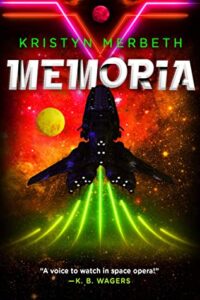 Memoria (The Nova Vita Protocol (2)) by Kristyn Merbeth | 08 Dec 2020|Orbit
Memoria (The Nova Vita Protocol (2)) by Kristyn Merbeth | 08 Dec 2020|Orbit
If you think your family is dysfunctional, you haven’t met the Kaiser clan. Just a year ago Kristyn Merbeth introduced them in Fortuna, in which a bunch of pirates/con artists/smugglers averted an interplanetary war, though not before an alien bio-weapon was used to make two worlds unlivable. In the process, they lost both their ship and their mob boss mom…and they really miss the ship.
Now stuck on the watery world of Nimbia, they’re trying to go straight, though not trying very hard. Hailed as heroes (though aware that they were actually as much at blame for the destruction as anyone else), they’re trying to find a way forward for the family. The viewpoint shifts back and forth between Scopia, the devil-may-care bad girl pilot who is bending all the rules she can to get them back on a ship where they belong, and Corvus, who had left the family to join the military and is trying to put a lot behind him, including fighting and living outside the law.
When the ruling council asks them to take a mission to one of the ruined worlds, it seems like just the ticket. Of course, assembling a crew may be a problem, as some of the people Scorpia has in mind are in maximum security prisons deep underwater. Ultimately, what they find on Gaia may turn out to be more terrifying than pacifying.
This looks to be the middle of a trilogy, but it has a solid arc of its own, setting the stage for wherever Merbeth wants to go with it. Family is never easy, and over the course of the book the Kaisers will forge some new bonds, break some old, and come to terms with who they are…at least for the moment.
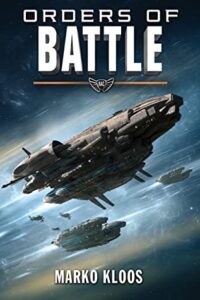 Orders of Battle (Frontlines Book 7) by Marko Kloos | 08 Dec 2020|47North
Orders of Battle (Frontlines Book 7) by Marko Kloos | 08 Dec 2020|47North
I don’t usually include books in a long series, but Orders of Battle starts a new arc in Marko Kloos series about the war between Earth and the Big Grey Blobs called the Lankies, so it’s a good place to jump in. We’ve followed Major Andrew Grayson from his start in a housing project through the entire conflict with the Lankies, and this book opens with him in command of a training facility on Earth, looking forward to retiring and finding a patch of green where he can spend time with his wife, who still outranks him.
When a senior offer asks him to lead a special tactics team on a somewhat vague mission, Andrew is conflicted. Not just because training is a cushy gig and he gets to spend time with his gal, but because the General offering the job has screwed him over in the past. The problem is that Brigadier General Khaled Masoud may be a right bastard, but when he points out to Andrew that he misses being at the pointy end of the spear, our boy knows the General is just plain right.
Besides, he gets to command a team of the best the service has to offer onboard a brand new Avenger class warship, and it’s probably a quick in-and-out mission to test the Lanky’s responses. Unless it turns out to be something much, much, more.
Andrew is a tremendously likable character, the sort of thoughtful commander that science fiction often serves up, and he’s matured a lot over the previous books. He’s still young for his rank, though a war will do that, and all his battles won’t be with the enemy. Marko Kloos remains one of the best mil-sf writers out there, and the only objection to his work, either here or in his Palladium series, is that they’re too short. The alternative (waiting longer between books) is a painful alternative, so I’ll take what I can get. Highly recommended.
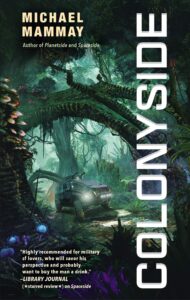 Colonyside: A Novel by Michael Mammay | 29 Dec 2020|Harper Voyager
Colonyside: A Novel by Michael Mammay | 29 Dec 2020|Harper Voyager
There’s a trope in fiction where you give a job you don’t really want done to some washed-up cop, private investigator or a Colonel passed over for flag rank. Think Miller in the Expanse. Well, Colonel Carl Butler (retired) might look like that guy from a distance, having committed planetcide twice and been thrown under the bus for it, but he’s the exact opposite.
If you give Carl Butler a job, you’d better really want it done, because getting it done is his thing, no matter the cost.
When a powerful CEO’s daughter goes missing at a research facility, Butler’s old friend and former commander, General Serata, taps Carl to look into it, and even gives him a small team of military personnel, including Carl’s old friend Mac for muscle and the very efficient Captain Fader, who is pretty much the opposite of the rule-breaking Colonel. No team is complete without a hacker, so Carl reaches out to Ganos. Ganos has even less regard for rules than Carl does, and a pretty big chip on her shoulder because of that thing that happened, but they’ll all work it out.
When they reach the colony planet they find its governor under a corporate stooge’s thumb, a military tied up in local red tape, and an environmental movement that hasn’t forgotten Butler’s role in killing planets and alien species. It’s complicated. Fortunately, Carl has two cases of 12-year-old Ferra Three whiskey, and a cargo crate full of ammunition provided by some old friends to smooth over the rough spots.
It’s a good setup, and if it’s reminiscent of the first two books, that’s just Carl’s past coming back to haunt him. The team gels nicely, and it could have been the launching point for a series of books, but it might be time for Carl to really retire. Either way, it’s a fine read clearly informed by the author’s own military background.
Collections, Anthologies, and Novellas
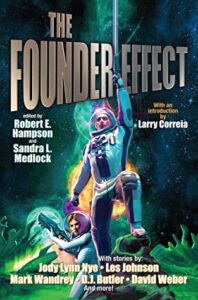 The Founder Effect by Robert E. Hampson and Sandra L. Medlock | Dec 1, 2020` | 01 Dec 2020|Baen
The Founder Effect by Robert E. Hampson and Sandra L. Medlock | Dec 1, 2020` | 01 Dec 2020|Baen
If you were put off by Kim Stanley Robinson’s Aurora (2015) in which he beat his drum that Earth is the only place humans can expect to survive, you’ll find The Founder Effect a reassuring blast from the past, where humanity moving out to the stars is what we do. If you go by the cover and the publisher’s description, you’ll fall for the heroic narrative portrayed by the blaster-wielding pair on the cover. To be sure, you’ll find some high-octane adventure inside, but for the most part, you’ll find something much better; stories of ordinary people solving extraordinary problems in order to find a foothold forty light-years from earth.
Editor Robert E. Hampson provided the collection of authors with a “very sparse time-line of colonization… (the) year the ship left earth, (the) year it arrived, the prion disease, disappearance of the New Virginia colony. Very little other detail.” What happened next was a collision of ideas, with several authors wanting to write the same part of the story. Rather than tell them who got what, he suggested that they talk to each other, and the result in several cases was short stories that linked together, shared characters, and an increased sense of continuity overall.
It’s sort of like an anthology TV show set in a shared universe where every week you get a different story and a different cast, except for a few characters that pop up more than once. You’ve got some luminary authors and some who’ll be new to you, but the one thing all the stories have in common is that, like Ian Douglas’ Stargods also out this month, it’s more concerned with the hard work of colonization than the angst of the characters.
Unlike a straightforward colonization novel, The Founders Effect drives home the reality that it takes all kinds to build a world, and that chance plays its own part.
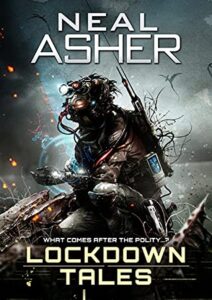 Lockdown Tales by Neal Asher | 15 Dec 2020|Newcon Press
Lockdown Tales by Neal Asher | 15 Dec 2020|Newcon Press
Yes, that lockdown, the one we’ve all been through thanks to COVID-19. But that’s not what the stories are about–it’s just when Neal happened to put them together. What they’re about is what happens after the Polity has been long gone, and in a lot of ways, I liked this more than the Polity/Prador war series of novels that culminated in The Human which came out last May. Throughout those books, and despite the title of the last book in the series, his protagonists became more and more mind-bogglingly post-human. For me, that made them less interesting, or at least harder to relate to.
Lockdown Tales, on the other, is just the opposite. This is a series of unconnected short stories set hundreds or thousands of years after the Polity stopped being a going concern, much like the Federation in the current season of Star Trek: Discovery. The protagonists are much diminished from the height of the Polity, many of them close to mark-one humans, though the stories tend to revolve around digging up Polity artifacts, often battle droids, artificial humans, or some combination of the two. As such, the stores are less about the clash of civilizations and more about people finding ways to survive, or more importantly, a reason to.
Depending on whether you’re a die-hard Neal Asher fan, or just coming to him, this is either a thoughtful coda to his Polity stories, or a great introduction to his writing.
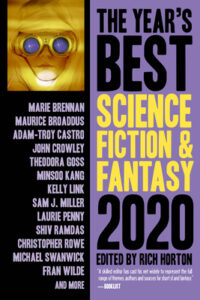 The Year’s Best Science Fiction & Fantasy, 2020 Edition by Rich Horton | 08 Dec 2020|Prime Books
The Year’s Best Science Fiction & Fantasy, 2020 Edition by Rich Horton | 08 Dec 2020|Prime Books
Rich Horton’s Year’s Best Science Fiction & Fantasy enters its 12th year with a collection that includes Marie Brennan, Maurice Broaddus, John Crowley, Theodora Goss, Xia Jia, John Kessel, Kelly Link, Sam J. Miller, Michael Swanwick, Fran Wilde, E. Lily Yu, and many others. Selecting the best fiction from Analog, Asimov’s, Clarkesworld, Lightspeed, Uncanny, and other top venues, The Year’s Best Science Fiction & Fantasy is your guide to “magical realms and worlds beyond tomorrow.”
I wasn’t able to get a copy before this column came out, but I’m really looking forward to it and expect I’ll give it a standalone review later.
- Crosshairs by Catherine Hernandez | 08 Dec 2020|Atria Books
- Sleepless by Louise Mumford | 10 Dec 2020|HQ Digital
Here you’ll find some links to some reliable lists for new releases and other reviewer’s lists for the month, which I may update as they come in. You might check them out at:
- Amazon.com: Editor’s Picks – Best Books of the Month: Science Fiction & Fantasy
- Goodreads: Science Fiction New Releases
- Kobo: New & Hot in Science Fiction & Fantasy
- Locus Magazine (online): Forthcoming Books
- Reading List (Andrew Liptak): Reading List
About the Reviewer’s Pics:
For the most part, this list sticks to what appeals to me as science fiction, about which I’m willing to be fairly flexible, but if here there be dragons, you can expect to find some tweaked DNA to explain it. I make up this list based on what I’ve read, what I heard and what I’m looking forward to. Please note that these are my selections, and do not represent the opinions of the editor or publication.
You can find me on Facebook at @Ernest Lilley or on my blog @ beingErnest
